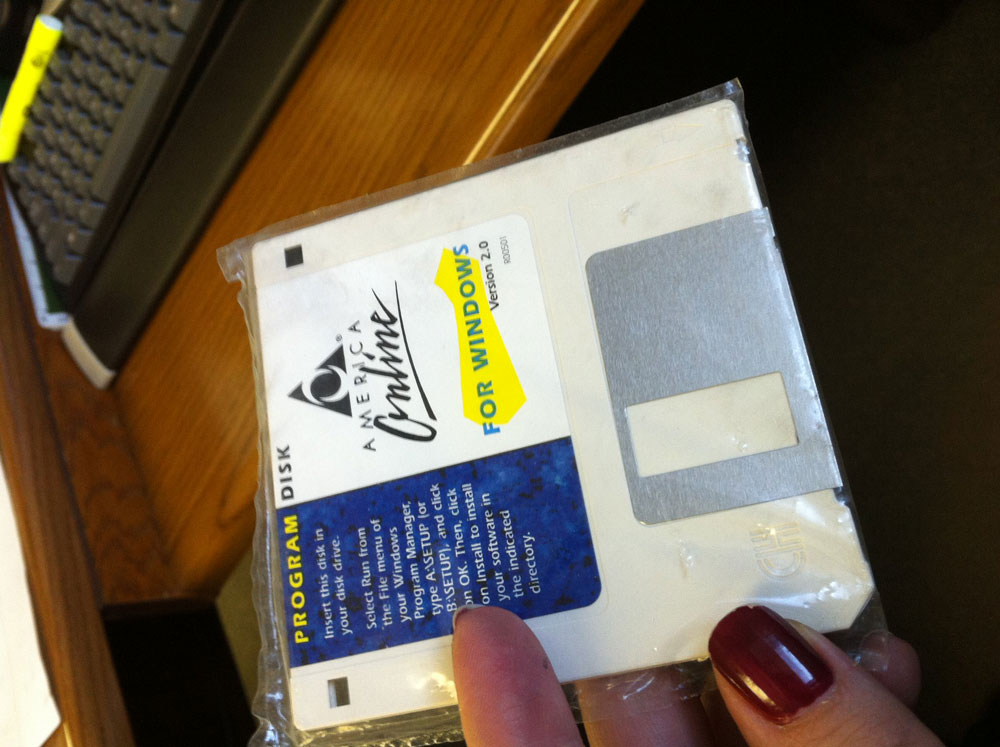A version of this post originally appeared on Tedium, a twice-weekly newsletter that hunts for the end of the long tail.
For nearly 30 years, the internet’s culture has been defined by a corporation’s move that seemed to, without any care about what was left behind, ensure that a sense of order would never again drive the growth of this series of tubes.
Videos by VICE
This phenomenon is, in many ways, the central tension on which the modern internet is built. And it’s a tension that most people aren’t aware of, even though it is an undercurrent secretly framing our online interactions.
I am, of course, discussing the Eternal September, a 1993 move by AOL to allow its users into the free-for-all that is Usenet. In the decades since, the conflict that move created, although long forgotten today, lingers in the way that technical users and not-so-technical users interact.
And, in too many ways, it is the basis for digital conflicts that have nothing to do with back then and everything to do with right now.
It’s time to retire the Eternal September. Twenty-seven years is long enough.
“September 1993 will go down in net.history as the September that never ended.”
— Dave Fischer, a Usenet user, discussing the start of the Eternal September in 1993, the point at which the chaos created by mainstream interest in the internet began to overwhelm the early discussion forums that originally attracted technical users to computer labs on college campuses and pokey modem connections at homes.

How the Eternal September set the stage for decades of online conflict
For decades, internet culture has struggled with the n00bs. For generations, as new people entered the digital gates, there was an inevitable sneer that awaited them as they hit the onramp.
If you’re not in the know, what do you know?
The internet is, of course, not alone in owning this dynamic. It plays out in all sorts of areas that traditionally have nothing to do with technology: High school, internships, sports teams, organized crime syndicates. The little guy knows nothing and has to work their way up. Most don’t. You get the idea.
But on the internet, we all technically should be on equal ground. After all, knowledge is at our fingertips at all times.
Yet tribalism has long defined the internet. We are built around subcultures upon subcultures, and these subcultures have only hardened over time, creating shells of insularity that have proven impenetrable.
And perhaps its most notable form came about in the mid-1990s, when the “Eternal September,” a concept involving the n00bs taking over Usenet, took hold. For those who don’t date back to this era, here’s the general gist: Each school year, thousands of new students would flock to Usenet groups for the first time, hoping to find community or learn from the folks already there. The problem was that they were green and didn’t really know much of anything, so they faced rejection until they got the gist.
In September of 1993, AOL added Usenet access, turning a controlled situation of steady ongoing community growth into something of a flood of never-ending n00bs. Suddenly, the social norms that the Usenet community was built around were broken at the seams, never to be repaired.
This was a major communal shift, and one that put early online users on the defensive. To put it simply, people were dismissive of their fellow users based on nothing other than the domain attached to their email address. It was an easy signifier; if you had an AOL.com email address, you were a dork, or beyond saving.
An essay on the commercialization of the internet, written in 1995 by MIT student Christopher R. Vincent, put the situation like this:
As accessing the Internet continues to grow easier for the novice user, it is inevitable that many of these social guidelines will fall to the wayside. This is not to say that new users should be denied access to Internet resources. It has been the first reflex in many newsgroups to flame any user who posted from an online service provider. Some of the larger providers, such as America Online have not received a very warm welcome to the network (note the formation of the alt.aol-sucks newsgroup). This reaction does not necessarily stem from elitism, but from a genuine fear that as more and more users appear, Usenet will fall apart. Indeed, this is a valid concern. The current system is not designed for the commercial-oriented direction the Internet is now taking.
Over time, the close association between AOL and lamers subsided, in part because our online access points evolved toward providers decided by local area, rather than consumer-oriented services.

But this dynamic of conflict and savvy emerged in other ways. When web-based communication alternatives emerged to replace Usenet, new types of turf wars appeared: Apple vs. Microsoft; open source vs. proprietary; Something Awful vs. Fark; Digg vs. Reddit; liberal bloggers vs. conservative bloggers; early adopters vs. technical laggards; iPhone vs. Android. You get the idea.
In many ways, these ideological battles of the digital age only found gasoline with the advent of social mediums, which helped to better connect people, but failed to account for the side effects that came with all that.
But the internet, early on, played into this tribalism in ways that allowed it to evolve into something dangerous.
“The newbies could not be forced to accept what we now understand as a central tenet of cyberlibertarianism: that cyberspace, too, was a place, separate from the world, and thus free. For it all to work, all the visionaries needed was for everyone to recognize a small set of self-evident truths.”
— Bradley Fidler, an assistant professor with the Stevens Institute of Technology who specializes in researching computer network protocols, discussing in the IEEE Annals of the History of Computing the rise of what he calls the Eternal October—the understanding that “it is no longer possible to pretend (no matter one’s privilege) that cyberspace can circumvent the politics of civilization.” At the time he wrote this, it was October 2016, ahead of a U.S. election that helped bring some scary forces into the world. I can only imagine how Fidler must feel in October of 2020.

Why, in many ways, the Eternal September is still going strong
Look, I’m not going to tell you that we have a constant influx of newbies hitting the internet at all times. That certainly is not what I mean when I describe the Eternal September as an ongoing thing.
But I do think that the spirit that led to the Eternal September becoming a landmark in the first place is still very much there. It has simply taken new forms.
There’s a modern term for what this is called, in fact: Gatekeeping. The idea that, because of your identity or lack of experience, you shouldn’t have access to an online community.
Now, to be clear, there are lots of kinds of gatekeeping in terms of the internet—for example, the technical barriers created by large companies to shape the broader network, whether internet service providers like Comcast or Verizon, or major tech firms like Google or Facebook. Those figures deservedly need their callouts.
But in this case, I’d like to focus on a particular cultural kind of gatekeeping, the kind that leaves people out for reasons of elitism, fear, or simple “othering.”
Earlier this month, a great example of this type of gatekeeping emerged on Twitter when a user claimed that they assumed anyone who used a mouse to program was a junior programmer. That user (rightly) got criticized over it—though I’ll pass on linking the viral tweet, because who needs to add to that kind of drama? But examples that don’t get called out in quite that way abound online, and they represent the way that users tend to focus on their own tribes.
Back in 2017, before our world became even more divided, CBC News columnist Ramona Pringle wrote a piece about how digital tribalism has proven a nasty side effect of highly amplified online echo chambers:
In and of themselves, tribes aren’t inherently bad. We all long to be part of something bigger than ourselves, and tribes fulfill that need. But where we get into trouble is when we introduce borders, which separate my land from your land, and by extension, my tribe from your tribe. When borders are violated, we fight. This, in broad strokes is the root of all war.
The Eternal September, in many ways, was the opening salvo in decades of division on the internet. And in the years since, it has only gotten worse.
In many ways, we understand the people around us even less than we did a few years ago. We aim for the jugular instead of the handshake. And by the time the word “compromise” is thrown around, it’s already too late. It’s a sign of weakness.
It is perhaps sad to think about, considering the early internet was built around utopian dreams. But it’s where we are. I’ll let you draw the through line between ’90s programmer/IT elitism and some of the internet’s modern day problems, because ultimately all those programmers helped lay the foundation for today’s tech infrastructure.
I’m still idealistic that some of that utopian spirit is out there, if you know where to look. But I wonder if, in the big fight for protecting netiquette, the early internet set a bad example for all the people that came after, who jumped in not looking for help, but looking for a fight. The initial separation between the normal and the technical that the Eternal September fostered underlined the tribalism that other internet users follow without even thinking about it. It discourages people from taking part in communities—especially those underrepresented in STEM fields—and sows the kinds of division that attract users to misinformation.
And I wonder if the same types of users who criticized the n00bs way back when are the same folks who can help get us back—by setting an open-arms example that other communities can follow.
At a time when Godwin’s law is less an observation and more a genuine worry, perhaps there are bigger fish to fry than whether or not someone asked a technical question the right way … and those technical users might need to shift their plan of attack accordingly.
“We need to make sure that Rust is prepared to welcome people who are just learning about Rust today. We don’t want anyone to feel like they’re late to the party.”
— Tim McNamara, a software developer and writer who focuses on the Rust programming language, making a case for leaning into the Eternal September, as far as the Rust community goes. It’s a refreshing take from someone in a technical community, and an approach that others should follow.
So, you might be wondering: Why write about this topic, and why now?
Honestly, what got me thinking about it was one specific reaction to a recent piece I wrote about the mainstream demise of FTP. I aimed really broad with that piece, because honestly, that’s usually who I write for—someone who knows something about technology, but who doesn’t know everything and is curious about learning more.
Functionally, the point of my piece was that plain vanilla FTP is on its way out, a vestige of the past for the vast majority of people, thanks to its forthcoming removal from major web browsers. But there are people in narrow spaces who likely will never stop using it—or, who choose not to stop.
While I can get technical, I generally write for regular people who know a thing or two about technology but who, perhaps, aren’t engineers.
And well, this user was a technical user in a highly technical role. And they decided to mock it for not covering specific technical cases where it might persist, rather than spending five seconds considering that they may not be the target audience for this piece. Cockroaches are everywhere—you don’t have to tell me.
I’ve seen this with other things we’ve written as well. Last year, I ran a piece about OS/2’s continued use on the NYC subway system, and I spotted a reader who got upset because we focused on the obvious novelty of a vintage operating system being used in a high-profile way, rather than focusing on the low-level technical aspects that may appeal to that specific user but may go over everyone else’s heads.
I get it. You might get upset if you dive into this with the expectation that we’re going to talk about code or infrastructure on here, and that’s not what you get.
But the reason that technology content is often written more broadly is because, well, writers often want to open up the gates and encourage people to take a deeper look into tech. As much fun as it is to do a deep technical dive into the nuances of how a system is designed, there is a deep threat of losing people if you go too deep without explaining why they should care.
Tying back to our discussion of the Eternal September in this piece, I would also like to make a broader point: We have to figure out a way to bridge the gap between technical and non-technical users online. To pretend that there isn’t room to offer a helping hand, or that we can just focus on our own tiny bubble, just isn’t working anymore.
In September of 1993, well-established users who felt their territory was being encroached on by people who didn’t earn their place in the digital culture reacted by being inhospitable to those users.
It’s nearly three decades later, and in the years since, tech has very much won. Our world has been redefined by it, in ways large and small. And while technical corners can and should exist, we should no longer pretend that technical users have a monopoly on these stories.
And, honestly, given the way that technology has negatively affected the lives of so many, we need to do a better job explaining it to the average person, so they have a chance to grab a hold of the ways that algorithms define what we see online, or how automation might reshape our lives and careers, in ways good and bad.
The Eternal September is over. We’re well into October now. We need to open up the gates.
More
From VICE
-

Getty Images -

Illustration by Reesa. -

Gerenme/Getty Images -

(Photo via South_agency / Getty Images)
